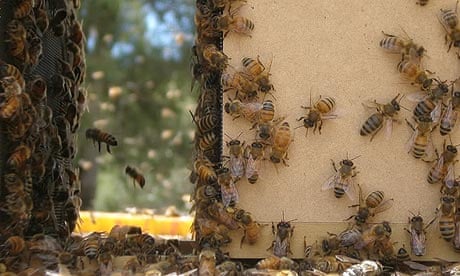Environmental groups including the Soil Association and Buglife are making a renewed call for an end to the use of neonicotinoid pesticides, which are among the most commonly used pesticides worldwide, after a new study linked them to a decline in bee in bee populations.
The study, published in the journal Toxicology, says the effects on bees of two particular neonicotinoid pesticides, known as imidacloprid and thiacloprid, have previously been underestimated and may explain the decline in bee populations.
It says even low concentrations of the pesticides may be more deadly then previously thought due to their high persistence in soil and water, supporting claims for the role that pesticides may play in bee deaths.
'The acceptable limits are based mainly on short-term tests. If long-term studies were to be carried out, far lower concentrations may turn out to be hazardous. This explains why minute quantities of imidacloprid may induce bee decline in the long run,' says study author Dr. Henk Tennekes.
Calls for a ban
Buglife campaigner Vicky Kindemba has welcomed the new research, saying it adds support to calls for a suspension in the use of the pesticides in the UK.
'This new information adds to the growing body of evidence that neonicotinoid pesticides are very harmful and even at extremely low levels in our environment they could still negatively impact on UK wildlife including pollinators, soil organisms and aquatic invertebrates,' Kindemba said.
The Soil Association said other products containing the pesticides should also be withdrawn from general sale in UK supermarkets, hardware stores and garden centres.
'If the honeybee disappeared off the surface of the globe forever we'd be facing up to an unimaginable food crisis,' said a spokesperson. 'This latest research only adds to the evidence that is already strong enough to justify an immediate ban on neonicotinoids today.'
The campaign group has written to the chief executives of B&Q, Wilkinson's and Wyevale asking them to withdraw any products containing neonicotinoid pesticides from their store.
Government disregards warning
Responding to the new study, Defra said the UK would not be following some other EU countries in restricting the use of neonicotinoids.
'This research highlights a need for more data on long-term risks to bee health. We have already been considering this and pesticide companies will soon need to provide this data under new EU rules.
'We will keep this area under review and will not hesitate to act if there is any evidence of an unacceptable risk to bees,' said a spokesperson.
Useful links
Full Study: The significance of the Druckrey–Küpfmüller equation for risk assessment — the toxicity of neonicotinoid insecticides to arthropods is reinforced by exposure time

Comments (…)
Sign in or create your Guardian account to join the discussion